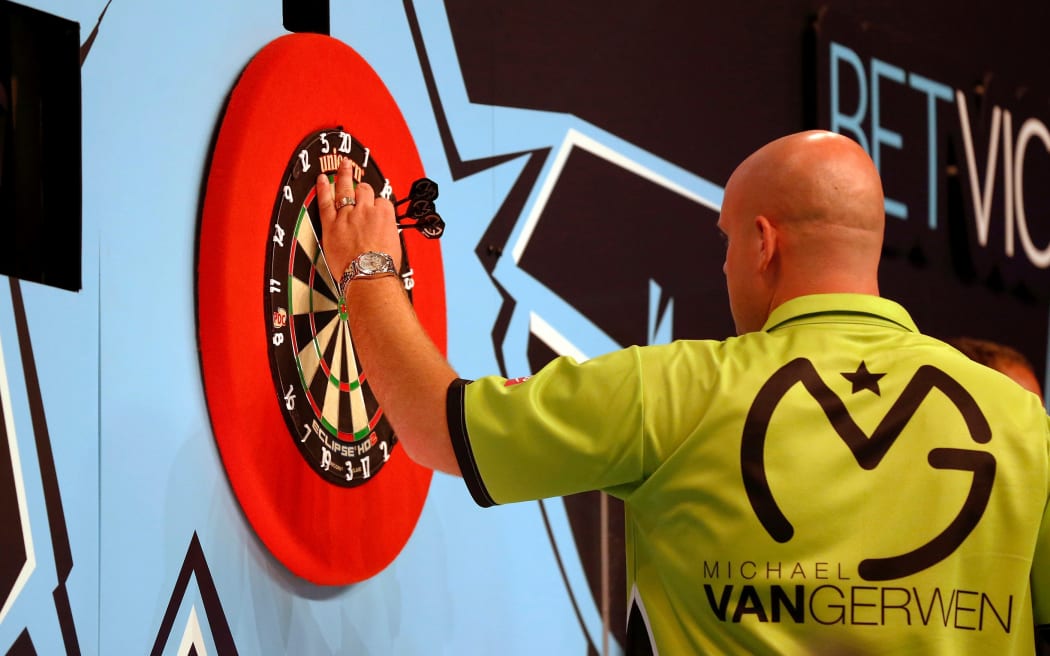Darts should be an Olympic sport because it requires precision and skill, making it a competitive and entertaining game that appeals to a wide audience. Darts, with its precision and skill, makes a strong case for being included as an Olympic sport.
This popular game, often played in pubs and sports bars, is not just a casual pastime but has evolved into a competitive sport. The objective is simple: players throw small, pointed projectiles at a circular target, aiming to achieve the highest score possible.
By requiring focus, accuracy, and strategy, darts tests the physical and mental capabilities of players. It also offers an engaging spectator experience, with dramatic moments when players hit the elusive bullseye or score double points with a last-minute throw.
Therefore, introducing darts to the Olympic Games would attract a broad audience and add diversity to the roster of sports.

Credit: www.rnz.co.nz
Why Darts Deserve Olympic Status
Darts has long been appreciated as a competitive sport, with millions of players from around the world participating in tournaments and leagues. In recent years, there has been a growing movement to include darts as an Olympic sport.
Growth In Popularity And Participation
The popularity of darts has seen a remarkable surge in recent years, with an increasing number of players and fans engaging with the sport. According to a survey, approximately 6.7 million adults play darts in the United States alone. This represents a significant growth in participation, showcasing the widespread appeal of the game.
Furthermore, darts is a sport that transcends age, gender, and physical ability. It can be played by people of all ages, making it inclusive and accessible to a diverse population. The increasing numbers of players participating in darts leagues and competitions globally highlight its potential to draw a large viewership and support as an Olympic event.
The growth in popularity and participation of darts is a clear indication that the sport has the potential to captivate and engage a global audience, making it a compelling argument for its inclusion in the Olympic Games.

Credit: www.history.co.uk
Physical And Mental Skills Required
Contrary to popular belief, darts requires a significant amount of physical and mental skill. It demands precision, focus, and hand-eye coordination. Players need to maintain steady balance and perform repetitive physical actions with accuracy and consistency.
Additionally, darts also tests a player’s mental acuity, requiring strategic thinking, concentration, and the ability to quickly adapt to changing game situations. The pressure of executing shots under intense conditions adds an additional level of mental challenge to the game.
These physical and mental skills, combined with the competitive nature of darts, make it comparable to many existing Olympic sports. Just as archery and shooting require precision and focus, darts showcases similar attributes, making a strong case for its integration into the Olympic Games.
Inclusion Of Niche Sports In The Olympics
The Olympic Games have a history of embracing niche sports, providing a platform for lesser-known disciplines to gain global recognition. This inclusion not only allows athletes from these sports to showcase their talents but also broadens the diversity and spectacle of the Games.
Darts, with its increasing popularity and global reach, offers a unique opportunity to further diversify the Olympic program. Just as sports such as surfing, skateboarding, and sport climbing have been recently introduced to the Olympics, darts could bring a new dimension of excitement and competition to the Games.
By including darts as an Olympic sport, the Games would gain a sport that has a dedicated and passionate fanbase, while also showcasing the skills and talent of its top players on an international stage.

Credit: www.reddit.com
Arguments Against Darts As An Olympic Sport
Arguments against Darts as an Olympic Sport include its lack of physical exertion and skills compared to traditional Olympic sports. Critics argue that darts primarily requires accuracy and skill rather than athleticism, making it incompatible with the Olympic ethos. Additionally, skeptics question the global popularity and cultural significance of darts, suggesting that it may not resonate with a wide audience.
Perception As A Bar Game Or Hobby
There are several arguments against including darts as an Olympic sport. The perception of darts as a bar game or hobby is one such argument. The sport has long been associated with pubs and leisure activities, which may undermine its credibility as an Olympic discipline. Critics argue that the casual and relaxed atmosphere of dart competitions contradicts the traditional intensity and professionalism associated with the Olympics.
Lack Of International Federation And Standardization
Another compelling argument against darts becoming an Olympic sport is the lack of a cohesive international federation and standardization within the sport. Unlike established Olympic sports such as soccer or basketball, darts does not have a universally recognized governing body that regulates the game at a global level. The sport is organized and played differently in various regions and countries, leading to inconsistencies and potential controversies in terms of rules, equipment, and competition formats.
Availability Of Alternative Traditional Olympic Sports
The availability of alternative traditional Olympic sports also poses a challenge for darts to be recognized as an Olympic discipline. The Olympic Games already include a wide range of sports that have a long-standing history and cultural significance.
These sports not only showcase athletic prowess but also uphold the values and traditions of the Olympic movement. With limited spots available for new sports, introducing darts as an Olympic sport may come at the expense of existing disciplines that are deeply rooted in Olympic tradition.
To Olympic Darts or Not: My Take
In my personal opinion, I believe that darts should not be included in the Olympics. While I understand that darts require a high level of skill and strategy, I believe that the limited physical activity involved and the perception of darts as a pub game rather than a sport could impact its legitimacy as an Olympic event.
Additionally, the questionable legitimacy of some professional darts organizations is a concern that should be addressed before darts are considered for inclusion in the Olympics.

Wrapping Up
The question of whether darts should be an Olympic sport is one that invites much debate. While some argue that its competitive nature, global popularity, and technical skill make it worthy of inclusion, others maintain that it lacks the physicality and tradition associated with traditional Olympic sports.
As the world of sports continues to evolve, only time will tell if darts will find its place on the Olympic stage. Ultimately, the decision rests on striking a balance between tradition and embracing new forms of competition.
FAQs
Why is there opposition to including darts in the Olympics?
Opponents of darts being included in the Olympics cite concerns about the perception of darts as a pub game rather than a legitimate sport, the limited physical activity involved, and the questionable legitimacy of some professional darts organizations.
Are there any doping or match-fixing concerns in the professional darts world?
A: While doping and match-fixing are not unique to darts, there have been concerns about the legitimacy of some professional darts organizations. Addressing these issues is important for the integrity of the sport and its potential inclusion in the Olympics.
Would darts be the only non-traditional Olympic sport?
No, the Olympics have included a number of non-traditional sports in recent years, such as skateboarding, surfing, and sport climbing. However, the inclusion of new sports is always subject to approval by the International Olympic Committee.
How would darts as an Olympic sport impact its global popularity?
Being included in the Olympics would certainly bring more attention to darts on a global stage, potentially increasing its popularity and exposure to new audiences. However, it is difficult to predict the long-term impact on the sport’s popularity.
What steps would need to be taken for darts to be included in the Olympics?
For darts to be considered an Olympic sport, it would need to meet the criteria set by the International Olympic Committee, including having a recognized international federation, complying with anti-doping regulations, and ensuring gender equality in participation. Additionally, the IOC would need to approve its inclusion in the Olympic program.



